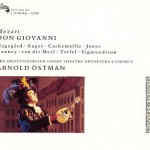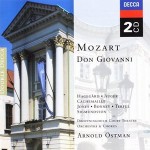Don Giovanni
1990, L’Oiseau Lyre/Decca
(Håkan Hagegård, Gilles Cachemaille, Arleen Auger, Nico van der Meel, Della Jones, Barbara Bonney, Bryn Terfel, Kristinn Sigmundsson; Drottningholm Court Theatre Chorus; Drottningholm Court Theatre Orchestra, cond. Arnold Östman)
Arnold Östman’s Don Giovanni is a quintessential example of period-instrument Mozart. The orchestral sound is light, the tempos are brisk, the voices are often lighter than we’re used to hearing, and generally it’s the type of performance that lovers of Romantic Mozart will dismiss as lacking in gravitas. But as far as I’m concerned, it’s excellent. Nothing is mindlessly speedy: indeed, some passages, like the peasant wedding music, are slower than usual. Every tempo feels carefully chosen to serve the drama. And with its dramatically vivid cast of singers, Östman’s crisp, energetic sound world both dances with buffa charm and pulsates with dramatic tension. What it lacks in Romantic-style power and gravitas it makes up for in thrust: the Commendatore scene is so full of terror with its pulsing tempo and blaring brass that I never once miss the traditional slow grandeur. Östman uses the original Prague version of the score, with the Vienna numbers plus an alternate version of the overture included as appendices.
At first it was hard for me to imagine Håkan Hagagård, Ingmar Bergman’s adorable Papageno, as Don Giovanni. But he proves himself a natural in the role. His light baritone may lack the sheer seductive sheen and power of some Dons, but it still has plenty of silky, buttery charm, and he offers a lively characterization, equal parts amiable suavity and ruthless fire. Equally vivid is Gilles Cachemaille’s endearingly disgruntled Leporello, sung with a rich yet rugged bass-baritone that contrasts perfectly with Hagegård’s more elegant sound (they have great fun imitating each other in Act II). Arleen Auger, a lighter voice than we so often hear as Donna Anna, makes a lovely case for such casting with her sweet, creamy sound and warm, urgent characterization. At her side, Nico van der Meel is a tender, effective Don Ottavio, with a gentle, agile tenor of moderate sweetness. Della Jones is a fine Elvira, her voice delicate yet fully equipped for the music’s demands and with no lack of dramatic spirit. What’s missing, though, is a sense of internal consistency; she seems to switch at random between heartbroken fragility and wild, venomous rage instead of believably combining the two qualities. Barbara Bonney is an ideal Zerlina, crystalline-toned, feisty and enchanting, while a very young, not-yet-famous Bryn Terfel is a standout Masetto with his dramatic skill and earthily handsome bass-baritone. Kristinn Sigmundsson is a rich-toned, imposing Commendatore, less powerful than others, but adept at handling Östman’s quick tempos.
If you want your first Don Giovanni to be a period instrument recording, then I recommend this one wholeheartedly. It’s enjoyable from beginning to end.






Mark B
February 15th, 2014 at 02:33
I just listened to this. I agree wholeheartedly. It’s great to have a version of this opera where people die soon after getting stabbed and the Don sounds like he’s in a hurry to get laid!